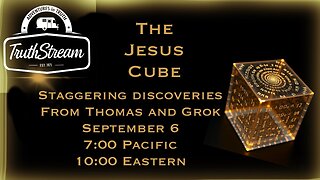Premium Only Content

39. Unique Mechanism – Keto 1
Sunday, March 3rd, 2019
Mechanism
3:43 pm to 5:06 pm [1 hour & 23 Minutes]
Video:
2. Unique Mechanism - Keto
Notes:
Around minute 25 I first conceive of the Unique Mechanism Behind the Problem, which I’ll end up using in the copy.
Around minute 36 I first break the mechanism behind the problem into 4 steps. They aren’t entirely fleshed out yet, but we’re getting there. I’ll end up using this 4 step logic sequence as the crux of my Unique Mechanism Behind the Problem and in the sales copy.
Around minute 46 I add more to the 4 steps, and they get closer to their final form.
What Is The Problem? (The Urgent Pain Point Prospect Faces)
The prospect is significantly overweight, at least 50 lbs. It’s affecting their quality of life – their confidence, their self-esteem, their happiness, their relationships. It’s also threatening their health. Their A1C and Blood Sugar levels are high, they are either pre-diabetic or diabetic, they have unhealthy cholesterol, they feel tired all of the time, have poor sleep, possibly suffer from gout, feel bloated and have stomach issues.
They’ve tried to lose weight for decades now. They’ve had success on diets over the years, but none of them last. They end up “yo-yo’ing” where the weight goes down, then comes back up. They struggle with cravings that can derail their success – especially sugar which is so addictive, it’s like a drug. They emotionally eat to mask the pain of their childhood, their divorce, or other traumatic moments in their life.
To Sum It Up: They are overweight now and it’s affecting their personal life and threatening their health. They’ve tried different diets in the past and never had long-term success.
Unique Mechanism Behind Problem = Addiction
You’re addicted to foods that are making you fat.
Sugar Makes You Fat And It’s Addictive. PROOF: when you have high blood sugar, the body creates insulin, sugar stored as glycogen, or burned as energy or stored as fat, you never really see skinny type 2 diabetics (proof element). Most people’s bodies run this way. Eating more sugar = higher blood sugar = more insulin = more stored body fat = insulin resistance = diabetes.
Addictive:
David Ludwig and his colleagues at Harvard did a very sophisticated study. It showed that foods with more sugar trigger a special region in the brain called the nucleus accumbens. This is the same part of the brain that is triggered in addicts when they are using cocaine or drugs, or gambling, or drinking.
This study was published in the American Journal of Clinical Nutrition – one of the most respected journals out there.
It was a randomized, blinded, crossover study using the most rigorous design to ward off any criticism (which will come from the $1 Trillion Food Industry).
They took 12 overweight or obese men and gave them a low sugar milkshake (37% glycemic index), and then four hours later, they measured the activity of the brain region that controls addiction (nucleus accumbens). They also measured blood sugar and hunger.
Then several days later, they had the men back for another milkshake. But this time the milkshake was different. The milkshakes were designed to taste identical, however, this second milkshake was designed to be high in sugar with a high glycemic index (84%). Everything else was the same though – the shakes had the same amount of calories, proteins, fats, etc.
Each participant received a brain scan and blood tests for glucose and insulin after each version of the milkshake. Without exception, they all had the same response. The high sugar milkshake caused a spike in blood sugar and insulin, and an increase in reported hunger/cravings four hours after the shake.
When the high glycemic shake was consumed, the nucleus accumbens lit up like a Christmas tree. This pattern occurred in every single participant and was statistically significant.
Pretty shocking right? But this study didn’t happen in a vacuum. Dr. Eric Stice, a neuroscientist at the Oregon Research Institute who has used fMRI scans has also found that sugar activates the same brain regions that are activated when a person consumes drugs like cocaine. He also found that heavy users of sugar develop a tolerance (they need more sugar to feel the same effect) – that’s one of the hallmarks of substance dependence.
Dr. Nora Volkow M.D. found the same thing in her brain scans (she’s with the National Institute of Drug Abuse).
And Nicole Avena Ph.D., a psychologist at Princeton University was even able to make rats sugar dependent.
So were we always this addicted to sugar? No. In fact, in 1800 the average person had 10 pounds of sugar per year. Today they have 140 pounds of sugar.
But the health effects are brutal.
As world-famous Dr. Mark Hyman puts it:
What if Kobe Bryant or LeBron James went on national television promoting the benefits of “cocaine water” to increase sports performance? Would you allow heroin dispensers in your kid’s school? Think heroin lollipops or morphine muffins. This is exactly what’s happening in America today.
He goes on to mention that some animal studies show that sugar is eight times as addictive as cocaine.
Of course, I could go on and on about how addictive sugar is, but why don’t we just do a little experiment…
And this is something that I need YOUR active participation in.
Ready?
Take a look at the following picture:
These are French green beans…
And I want to know how they make you feel?
Maybe you’re thinking “oh yeah, those don’t look bad”…
Or like “I should be eating more green beans.”
You probably look at this picture, and you think “yeah those look fine.”
Great.
Now I want you to look at this next picture…
Look at this picture…
Really look at it.
How does it make you feel?
For me personally…
My mouth starts to water. There is noticeably more saliva. I also start shaking my leg, my eyes start moving faster, darting around. I start to imagine taking a giant glob of these gummy bears and stuffing them in my mouth. The sweetness, the fruitiness, the chewy goodness. It gets me physically excited talking to you about it.
Now maybe you don’t love gummy candies. So let’s look at this slice of cake…
Or these to-die-for-cookies…
What’s your reaction here?
If you’re like most Americans, myself included, you had a totally different reaction to the last three photos…
The pictures of sweets…
Then you did to the green beans.
Which of the four foods you just saw are you thinking about right now?
It’s probably not the green beans, right?
And no, I’m not trying to torture you, or make you hungry…
I’m trying to make a point…
Which is that sugar is incredibly, incredibly addictive.
But it also makes you fat too.
This probably doesn’t surprise you – in fact, you’ve probably heard this before…
But let me go ahead WHY sugar makes you fat…
And this is going to be super important to understand, so pay close attention here.
According to Dr. Juan Gallegos of the University of Utah…
When you eat foods that are high in sugar…
The sugar enters your bloodstream.
Once that happens, your pancreas senses that you have high blood sugar…
And releases something called insulin, which is the hormone responsible for regulating blood sugar (you’ve probably heard of insulin in relation to diabetes).
Now insulin’s job is to help take sugar out of your bloodstream and send it to the cells in your liver, muscles, and other vital organs – so they can use the sugar for energy.
But the problem is, when you have a lot of sugar in your body…
Most of it can’t be used for energy – there’s too much….
(It’s like using an oil tanker to fill up your car, you only need a few gallons, but the tanker has thousands or millions. Now imagine if that tanker just kept pumping gas into your car even after the tank was full, it would spill out everywhere and cause a disaster).
The sugar has to be stored somewhere though, so the body stores it as fat. This fat gathers in places you’d expect, but it’s also stored in surprising places like your liver – which is why there’s such thing as fatty liver disease.
So the result is that sugar is making you fat.
2. You might not realize that most carbs are turned into sugar – PROOF – the science behind how carbs are turned into sugar. Reminding them that sugar makes them fat, and this is why most carbs make them fat too, it’s the exact same thing.
Now here’s the thing – according to Harvard University…
Carbohydrates are by definition sugar.
There are simple carbs with simple sugars…
And there are complex carbs made up of a chain of different sugars.
Once you eat these carbs they are broken down by the body and turned into simple sugars.
Now it’s true that some complex carbs take longer to digest (when they have a high fiber content) – and these complex carbs are indeed better for you than simple carbs.
But even then, most complex carbs are NOT high in fiber…
In fact, white bread, potatoes, pasta, pizza, flour, grain, whole wheat bread – all of these things are high in starch but not high in fiber…
Which means they are still broken down rapidly in your body….
And again, they are turned into sugar.
Obviously this is a big problem…
Because as we’ve just talked about:
Sugar is addictive and makes you fat…
And since most carbs are made up of sugars, and your body breaks them back down into sugars…
It’s fair to say that most carbs are addictive and make you fat too.
3. Now that you understand that most carbs (besides fiber) = sugar….
You also understand why carbs make you fat. Plus it now makes sense why so many people say they have such a hard time giving up bread, pasta, dairy, cereal, chips, and other carb-heavy foods. People talk about it being the “salt” or the sauce, or the texture, but it’s not. It’s the carbs at the foundation that are addictive and keeping you fat.
Do picture comparisons of salty chips, pizza, etc vs. more vegetables.
4. The truth is, this addiction is why you’ve never been able to lose the weight you wanted, or to keep it off for good:
• Low Fat = Bullshit Because of High Carb aka High Sugar aka Fat and Addiction
• Atkins doesn’t work long-term because you start reintroducing carbs but that’s like reintroducing heroin to an addict – just a little at a time. Also as a proof element – people lose a lot on Atkins at the start, but then begin to gain it back. Same reason Atkins isn’t that popular anymore today – it worked at first then stopped working. And when did it stop working – when you start introducing carbs back “in moderation”. Because again – reintroducing a little heroin to a heroin addict.
• Cutting Calories doesn’t work because the same thing – you’re saying instead of a lot of heroin, I’m just going to do a little heroin. But when something is that addictive, moderation doesn’t last.
• Weight watchers + Jenny Craig + Nutrisystem all the same thing – about fewer calories or grams of fat, but not about cutting out addictive carbs and sugar.
So another note on the addictive aspect: think about how hardships in life trigger people to emotionally eat. Whether it’s a death, a divorce, financial problems, relationship problems with family, etc – these are often times when people binge eat or eat extra unhealthy. They are masking pain (even traumatic childhood events).
These are the same reasons and times that someone who is a recovering drug addict will be at risk of relapsing as well.
Another time people who are trying to diet break their diet is when they are out at a restaurant, or a party, or with a group of friends, or on a vacation, etc – everyone else is doing it, they want to cut loose a little bit.
These are the same situations where a recovering drug addict might relapse too – at a party where everyone is doing cocaine, so they decide it’s okay to do cocaine too.
The point of those examples is just to make it clear how similar the link is between carb/sugar addiction and other addictions.
And we’ll want to make it clear too that their weight challenges and problems ARE NOT THEIR FAULT!
SPG NOTE: Story idea, women at mom’s funeral, there’s this big cake, she’s been on a diet and has lost some weight and feeling good. She doesn’t eat at the funeral, but the cake comes back to her house because family and friends are staying/visiting. In the night she sneaks down and eats the whole rest of the cake in between tears. The next day people are asking about the cake and she’s embarrassed to tell them it’s gone – she lies and says she forgot to refrigerate it and threw it out, people don’t believe her. This should make her stop but instead, she can’t, she goes on a sugar and junk food bender. It’s emotional eating, it’s addictive behavior (relapsing), it’s to mask the pain – and she knows it on some level but she quiets that voice and gives in to her urges – maybe until something even more awful happens.
Unique Mechanism Behind Solution:
Is to break free of their addiction to carbs and sugar. They have to do this by powering their bodies with something else, other than sugar or carbs, again both of which make them fat and keep them dependent, and hold them back from living their ideal life.
It’s the same way a former drug addict might replace cocaine with exercise, or an ex-alcoholic that now paints every night.
In the case of carb and sugar addictions…
The easiest way to break free is by replacing them with something healthier and better that doesn’t put them through horrible withdraws.
But what?
What science shows us – and what millions of everyday folks have found…
Is that the best thing you can do to break free of your carb and sugar cravings…
Is to replace them with fats and ketones.
When people do this, they are following the Ketogenic Diet, which I’m sure you’ve heard of at this point…
Especially since it has so much buzz from both celebrities and everyday folks.
Yet while you’ve probably heard countless stories of folks losing tremendous amounts of weight on the Keto diet…
You might not understand what it is, or how it works…
And you might be especially confused about those “ketones” I mentioned, and not know what they’re all about.
So let me explain…
Your body needs energy…
And most of us provide our bodies with that energy in the form of carbohydrates and sugars.
This is what we’re sold at the grocery store (low fat, carb-heavy foods), it’s what our parents and teachers and many in the government have told us to eat, and what we’re ADDICTED to.
It’s what the $1 Trillion Food Industry wants us to eat (because they produce a lot of it).
But as you know, powering your body primarily on carbs and sugars…
Is like powering your body primarily with cocaine.
Sure, you get some energy from it…
But the high only lasts a little bit, then you need more cocaine to regain your energy…plus it disrupts your sleep, your brain, your mood, everything else…
And it does long-term damage to your health too.
Well with the keto diet…
We’re replacing sugar and carbs (that are like cocaine)…
With fats and ketones…
And Ketones are one of the purest and best energy sources for your body that’s ever been discovered.
Here’s how the keto diet works…
First, we increase our intake of fat dramatically – usually to about 60% of our diet…
And we cut down on our carbohydrates significantly, from 100 grams + per day (many people have 200 or even 300 grams of carbs a day)…
To under 30 grams of net carbs per day.
When this happens…
Your body can no longer get energy from carbohydrates and sugars…
So it’s forced to find a different fuel source…
And fortunately, your body doesn’t have to look very far…
Because thanks to God’s good graces…
When there are no carbs or sugars around…
But lots of fat…
Our body naturally starts using fat as an energy source…
And specifically, it breaks down that fat into “ketones.”
And turn them into those “ketones” I keep mentioning.
Ketones are basically little units of energy…
Yet they are more energy-dense per calorie than sugar…
And they also happen to be an incredibly clean, efficient fuel source.
Now once your body has started producing ketones and using those for energy (instead of sugar)…
You’re said to be in a state of ketosis…
And there are numerous benefits associated with being in Ketosis.
First, there’s the fat burning and weight loss….
https://www.ncbi.nlm.nih.gov/pubmed/22905670/
Journal: Obesity Review, An Official Journal of the International Association for the study of Obesity, 2012
“showed the LCD to be associated with significant decreases in body weight, body mass index, abdominal circumference, systolic blood pressure, diastolic blood pressure” along with insulin levels, unhealthy fats, bad cholesterol, and inflammation.
https://www.ncbi.nlm.nih.gov/pubmed/9417152/
Journal: Pediatrics, 1998
At 30 grams carbs: morbidly obese children.
Over 8 weeks they lost an average of 33 lbs.
“Body composition studies indicated that weight was lost equally from all areas of the body and was predominantly fat.”
Lean body mass was not significantly affected.
A decrease in bad cholesterol
Sleep was improved to “normal levels”
Conclusion: “The K diet can be used effectively for rapid weight loss in adolescents with morbid obesity. Loss in lean body mass is blunted, blood chemistries remain normal, and sleep abnormalities significantly decrease with weight loss.”
https://www.ncbi.nlm.nih.gov/pubmed/12077732/
Journal: Metabolism 2002
Control kept their diet at about 48% carbs on average, test group ate a low carb diet of below 10%.
For the Low Carb, Keto Diet: “Fat mass was significantly decreased and lean body mass significantly increased at week 6. There was a significant decrease in serum insulin.”
70% of the fat loss in the keto diet group was related to less insulin, which makes sense because as we now know more insulin means more sugar means more fat being stored in your body.
Conclusion: “We conclude that a carbohydrate-restricted diet resulted in a significant reduction in fat mass and a concomitant increase in lean body mass.”
https://www.ncbi.nlm.nih.gov/pubmed/15148063/
Journal: Annals of Internal Medicine, 2004
120 overweight, hyperlipidemic volunteers.
Randomized, controlled trial.
First of all…
76% of the low carb group finished the 6-week study…
Only 54% of the low-fat group finished it…
Suggesting that it was a lot easier to stay on a keto diet than a traditional low-fat diet – possibly because you feel so full and satisfied and have such great energy on the keto diet.
What’s also remarkable is that the low-carb, keto group lost almost 2x as much weight as the low-fat group, and almost 2x as much fat mass (20.7 lbs on average for Low Carb Group). Unhealthy fats in the bloodstream went down, and bad cholesterol went down too.
Conclusion: The Keto Group had “better participant retention and greater weight loss.”
https://www.ncbi.nlm.nih.gov/pmc/articles/PMC2716748/
Journal: Experimental & Clinical Cardiology, 2004
83 obese patients (39 men and 44 women).
Results: “the weight and body mass index of patients decreased significantly.” Good cholesterol “significantly increased” while bad cholesterol “significantly decreased.” “The level of blood glucose significantly decreased.”
“The present study shows the beneficial effects of a long-term ketogenic diet. It significantly reduced the body weight and body mass index of the patients. Furthermore, it decreased the level of triglycerides, LDL cholesterol, and blood glucose, and increased the level of HDL cholesterol. Administering a ketogenic diet for a relatively longer period of time did not produce any significant side effects in the patients. Therefore, the present study confirms that it is safe to use a ketogenic diet for a longer period of time than previously demonstrated.”
Then there’s the lower blood sugar and ability to reverse Type 2 Diabetes
https://www.ncbi.nlm.nih.gov/pubmed/19099589/
Journal: Nutrition and Metabolism
A randomized study with 84 people who were obese and had type 2 diabetes.
Group 1: Keto Group (less than 20 g of carbs per day)
Group 2: Low calories but not low carb
Results: The keto group had 3x lower A1c after 24 weeks…
Keto group also lost significantly more weight than the low-calorie group(24 lbs vs. 15)…
The Keto group also saw a significant improvement in good cholesterol, while the non-keto group saw zero improvement…
Most importantly of all:
Diabetes medications were reduced or eliminated in 95.2% of the Keto Group, but only 62% of the low-calorie group.
Conclusion: “The diet lower in carbohydrate led to greater improvements in glycemic control and more frequent medication reduction/elimination than the low glycemic diet. Lifestyle modification using low carbohydrate interventions is effective for improving and reversing type 2 diabetes.”
https://www.ncbi.nlm.nih.gov/pubmed/19082851/
Journal: Lipids 2009
Three groups: Low Fat Diet, Low-Calorie Diet, Low Carb Diet.
The low carb diet participants: “had consistently reduced glucose (-12%) and insulin (-50%) concentrations, insulin sensitivity (-55%), weight loss (-10%), decrease in fat tissues (-14%)” and better cholesterol and less bad fats in their blood.
The low carb diet also reduced one of the biggest indicators of Type 2 Diabetes by 20%, while the other diet didn’t make a difference at all.
Conclusion: “The results support the use of dietary carbohydrate restriction as an effective approach to improving features of MetS and cardiovascular risk.”
Fewer Cravings…
https://www.ncbi.nlm.nih.gov/pubmed/16129086/
Journal of the American Dietic Association, 2005
Perceived hunger is lower and weight loss is greater in overweight, premenopausal women consuming a low carbohydrate/high protein vs. high carbohydrate, low-fat diet.”
Women in the low-carb group lost more weight, didn’t feel as hungry.
There’s more energy, lower cholesterol, better heart health, better mood, better sleep, etc, lower blood pressure:
https://www.ncbi.nlm.nih.gov/pmc/articles/PMC5452247/
Cardiovascular Health…https://www.ncbi.nlm.nih.gov/pmc/articles/PMC5782363/
^^ “A meta-analysis on 23 controlled trials involving 1,141 obese patients reported that the KD diet, in fact, has favorable effects on cardiovascular health.”
Now you’re probably thinking that while this makes sense…
Since carbs and sugar are so terrible addictive and bad for you, why don’t we cut them out entirely?
The answer is that even though we do still eat a small amount of carbohydrates on the Keto Diet…
These carbs are coming from foods that are high in fiber and super nutrient-rich…
Which means your body takes a long time to break them down and turn them into sugar.
As a result…
You can eat moderate amounts of these nutrient-rich carbs and your insulin won’t spike, your brain won’t register them as addictive, and they won’t make you get fat.
It’s kind of like the difference between cocoa leaves and snorting cocaine…
In Peru, people chew cocoa leaves at high altitudes to help with stamina, focus, and to avoid altitude sickness…it’s the equivalent of having a cup of green tee (it’s not addictive, has health benefits).
Well, that’s what small amounts of complex, fiber-rich carbs are like as well – they’re fine for you and even healthy.
But while chewing a few cocoa leaves a day is fine…
If you decide to do a giant line of blow – that’s a different story…
It’s the same difference between having a small amount of healthy, fiber-rich, nutrient-rich carbs each day…
Or eating four slices of cheese pizza…
Once is fine…one is terrible for your health.
So that’s the keto diet in a nutshell…
But what you’ll find is that while it sounds great…
Many people end up frustrated and SICK when they go on Keto…
They feel confused…
They plateau, or can’t keep doing keto, or they fall off the wagon.
That’s why we created the product.
Now you’re probably wondering
Specifically, replacing carbs and sugars with fats and ketones.
Why fats and ketones?
Your body is like an engine and it needs energy to run.
You can either get this energy from carbs and sugar…
Or you can get it from fats and ketones.
You already know what happens when your body runs on carbs and sugars:
Addictive, like a drug, short-term highs, and long-term crashes, you store fat and get fatter, long-term body damage, poor sleep (like a drug addict), irritability, foggy brain, etc.
But what happens when it runs primarily on fats and ketones?
Not addictive, long-term energy, better mood (sustainably), much better mental focus, and a sharper brain, you burn fat and get skinnier, better sleep reverses body damage.
How do you switch fuel sources?
This is what the ketogenic diet does…
You switch from running on carbs to running on fats.
Thoughts for the product: do we tell them to make the switch immediately and drastically, or will that cause “shock” like when an alcoholic gives up drinking cold turkey, or a heroin addict gives up heroin cold turkey. They want fast weight loss results – which means cutting back on carbs and sugars fast. How do we reconcile that?
-
 1:38:47
1:38:47
Badlands Media
1 day agoDevolution Power Hour Ep. 387: Trump, Epstein, Durham Mysteries, and North Korea Ops
77.9K19 -
 1:05:23
1:05:23
Man in America
13 hours agoSoaring Gold Exposes the Imminent Crash of the Old System w/ John Perez
39.5K7 -
 2:42:40
2:42:40
TruthStream with Joe and Scott
14 hours agoTHOMAS AND GROK: AI, Bible decodes, The JESUS Cube live 9/6 #487
25K2 -
 2:34:46
2:34:46
BlackDiamondGunsandGear
8 hours agoGet Prepped / After Hours Armory / LIVE SHOW /
17K1 -
 2:01:39
2:01:39
Tundra Tactical
7 hours ago $6.38 earned🛑LIVE NOW!! This spits in the face of the Second Amendment.🛑
27.1K4 -
 2:34:46
2:34:46
DLDAfterDark
5 hours ago $1.64 earnedIt's SHTF! Do You Have What You Need?? Let's Review Items & Priorities
19.1K4 -
 28:58
28:58
Stephen Gardner
7 hours ago🚨Explosive allegations: Rosie O’Donnell connects Trump to Epstein scandal!?
33.9K60 -
 LIVE
LIVE
SavageJayGatsby
2 days agoSpicy Saturday | Let's Play: Grounded
492 watching -
 2:06:27
2:06:27
MattMorseTV
8 hours ago $50.92 earned🔴Vance just went SCORCHED EARTH.🔴
128K180 -
 46:41
46:41
The Mel K Show
13 hours agoMel K & Corey DeAngelis | The Hopelessly Captured Teacher’s Unions: Biggest Threat to Our Children & Future | 9-6-25
36.5K5